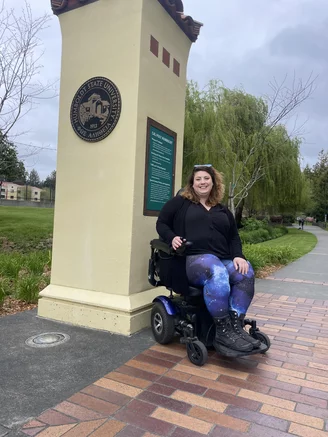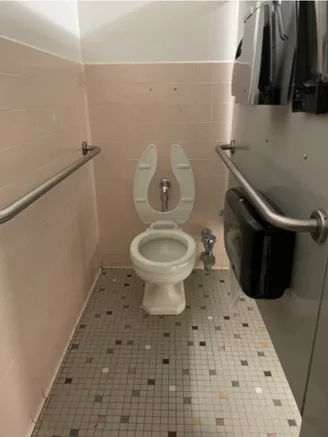Photo via humboldt.edu.
###
When Christine DiBella arrived at Humboldt State University (which would soon be rechristened Cal Poly Humboldt) as a transfer student in the fall of 2021, it wasn’t long before she realized the campus might prove challenging for her. DiBella has physical disabilities and uses a power wheelchair to get around, and in a Zoom interview Wednesday morning she said she encountered accessibility issues before even making it to her dorm room.
On the day she arrived, she said, “I couldn’t put the keycard into the keycard slot to open up the gate to my dorm.” The slot was located off the sidewalk and out of reach.
DiBella soon encountered more problems. The university’s Housing & Residence Life office had organized a hike on which newly arrived transfer students could meet each other, but the route wasn’t wheelchair accessible so she couldn’t participate.
During a campus fire drill, she was only able to evacuate from her third-floor dorm room in the College Creek Apartments by taking the elevator, which she knew would not be functioning in the event of a real fire or power outage. When she repeatedly asked university personnel to provide her with an adequate escape plan, such as one that includes an emergency evacuation chair, she got the runaround and was eventually told to just design her own.
These and numerous other allegations are included in a class action civil rights suit recently filed in U.S. District Court for the Northern District of California. The suit alleges that by failing to make its campus accessible to DiBella and other disabled students, Cal Poly Humboldt is violating Title II of the Americans with Disabilities Act and the Federal Fair Housing Act.
The complaint argues that DiBella has been denied meaningful access to numerous campus locations, including parking facilities, her dorm’s laundry room, the Jolly Giant Commons cafeteria, the student recreation center, certain classrooms and buildings and more, with assorted physical barriers limiting her access to residential and campus-life activities.
The latest version of her complaint, filed last week, further alleges that all 23 campuses in the California State University system have failed to adequately plan for emergency preparedness for students with disabilities. Defendants include the CSU’s board of trustees, its interim chancellor and the presidents of all 23 campuses.
DiBella, who remains enrolled at Cal Poly Humboldt, is being represented by Cat Cabalo, a partner in the San Francisco office of New Orleans-based law firm Pfeiffer Wolf Carr Kane Conway & Wise.
Cabalo joined in on the Zoom call Wednesday and said that, in researching the case, “it became evident that the problems that Christine was having were pervasive throughout [Cal Poly] Humboldt, definitely. And as we did more research [we found that] there is not one campus in the CSU system that allows for people with mobility disabilities to actively and meaningfully participate in emergency planning.”
DiBella says Humboldt’s lack of an adequate emergency evacuation plan caused fear and anxiety, and the physical barriers around campus often made her feel alienated or awkward. One day, while trying to get to a class in Room 201 of the Forestry Building, she found that the building’s front door was too heavy for her to open from her chair. According to the complaint, she relied on a stranger to open it, which was embarrassing because she prides herself on her independence.
Once inside, she looked for a restroom, but the one she found on the first floor had a handle that was too high, and inside she found no accessible stall for wheelchair users, only a narrow one with not nearly enough space to turn around. (See photo at right.)
“Other restrooms throughout the campus are not accessible for similar reasons,” the suit says.
Meanwhile, the elevator to the Jolly Giant Commons, aka “the J,” was often out of service for maintenance, eliminating her sole means of access to food on campus, according to the complaint.
Most of DiBella’s classes for her major have been in the Behavioral Social Sciences (BSS) building, which sits atop a hill that’s so steep her wheelchair can’t safely go up and down it, the suit says.
After lodging complaints about her living conditions, DiBella was moved to a first-floor room in the residence hall. It was smaller, and she found that she couldn’t use the closet because the rod was too high for her to reach; the bathroom was inaccessible because the door swung out toward her, blocking the hallway and leaving no space for her chair; and furniture prevented her from reached the window, leaving her unable to ventilate the humid room.
“Plaintiff tried to remedy these accessibility issues in the first-floor room by asking Humboldt if she could bring in her own furniture, but this was not allowed,” the suit says.
The lawsuit describes a series of similar experiences, and DiBella’s mounting frustration is clear in public comments submitted to the Associated Students board of directors.
“Wheelchair access!” she wrote in an email to the board in November. “Where is the disability access and compliance committee? Wheelchair access pathways are being blocked, I have no way to participate in the University. I am not safe. … it is offensive to treat me like furniture or cargo. I am Human! … I do not need permission for my body to exist.”
The suit alleges that Cal Poly Humboldt personnel retaliated against DiBella for speaking up. They labeled her disruptive and harassing, the suit says, and DiBella believes they required her to participate in a “conduct meeting” as retaliation for asserting her rights under the ADA.
“The message to Plaintiff is that she should shut up about systemic and pervasive physical and policy barriers that prevent her from participating in campus life and in activities that support her major and academic development,” the suit says.
###
Attorneys representing the CSU Board of Trustees and other defendants have denied the allegations, though to date their arguments have focused on asking the judge to dismiss the class action portion of the suit.
In a September filing, attorneys Alison K. Beanum and Douglas J. Collodel argued that it would be unfair and illogical to lump together all disabled students across the 23-campus system considering the unique conditions among individual campuses and students.
Campuses located in Sonoma or Humboldt counties may need a plan for forest fires, but that’s not necessary for campuses in Los Angeles or San Francisco, they argued.
DiBella’s claim, they said, “treats all students with a mobility disability as a single monolithic group. They are not. It is indisputable that the type and degree of disability will differ from student to student. For that reason, each student’s disability is best accommodated through a personalized plan.”
As for DiBella’s claim that all CSU campuses lack adequate emergency evacuation plans, the attorneys argued, “The entirety of Plaintiff’s class allegations is based on cherry-picked pieces of various emergency plan documents that Plaintiff found online through a cursory review, without any regard to whether those select quotes reflect a particular campus’s entire emergency planning procedures or the entirety of what is communicated to disabled students.”
Their argument asserted that DiBella is “flatly wrong” in claiming that none of the 23 CSU campuses have an ADA-compliant emergency plan. Their filing includes links to websites and documents from each university campus that allegedly refer to each one’s plans for emergencies and evacuations specifically applicable to disabled students, though most of the links were broken by the time the Outpost clicked them this week.
The CSU’s attorneys, who are employed at the multinational firm of Clyde & Co, argued that DiBella’s case “would require a campus-by-campus and student-by-student inquiry” to review detailed policies, individual student circumstances and other evidence.
However, in April the judge allowed the class action case to proceed, giving the defendants until June 7 to respond to DiBella’s third amended complaint.
“We survived against the motion to dismiss those class claims last month,” Cabalo said on Wednesday, adding that the next step will be asking the judge to certify the class.
The lawsuit also asks for a permanent injunction directing the CSU to modify any facilities that don’t conform to ADA guidelines, provide accessible student transportation and make “appropriate policy changes.”
DiBella is also pursuing “appropriate damages,” and while Cabalo said the exact dollar amount is still being worked out, similar ADA-related cases have seen awards for damages in the range of $340,000 to $700,000, adjusted for inflation.
The Outpost emailed Cal Poly Humboldt seeking comment on the case Tuesday. On Wednesday they said they were working on getting us a comment, but on Thursday morning they referred us to the CSU. A voicemail left for the CSU’s public affairs manager had not been returned by the time of publication.
After being moved from the dorms to one of the Arcata hotels that Cal Poly Humboldt now uses for student housing, DiBella moved into different off-campus housing.
“But I would very much like to be able to live on campus and have the support of that community,” she said.
###
UPDATE, 12:27 p.m.: Shortly after this post was published, CSU Chancellor’s Office Public Affairs Manager Hazel J. Kelly emailed the following statement:
The CSU values safety and inclusion and is committed to providing a positive and meaningful experience for all students. We disagree with the allegations and Plaintiff’s characterization. The CSU and its 23 campuses maintain publicly available emergency evacuation plans. Due to the pending nature of the litigation, the CSU is unable to comment further, but we do look forward to addressing Plaintiff’s claims.



CLICK TO MANAGE